
Check it out: “politically correct” came into common usage in the United States in the 1940s and ’50s, when Socialists and Communists clashed over Stalin’s alliance with Hitler. Communist party doctrine was called the “correct” party line.
Jewish educator, author, and activist Herbert Kohl explains:
“The term ‘politically correct’ was used disparagingly to refer to someone whose loyalty to the [Communist party] line overrode compassion and led to bad politics. … [It] was meant to separate out Socialists who believed in equalitarian moral ideas from dogmatic Communists who would advocate and defend party positions regardless of their moral substance.”
People who were “politically correct” were people who said racism and genocide didn’t matter; people who claimed the party line was more important than actual people’s lives.
Who does that sound like to you?
In the early 1990s, “politically correct” started being used in the way it is best known today. Right-wing intellectuals began using it to disparage those who sought to combat racism, sexism, and homophobia in higher education and elsewhere. In 1992, Kohl wrote:
“It is a clever ploy on the part of neoconservatives, a number of whom were former [Communist party] members and know how the phrase ‘politically correct’ was used in the past, to insinuate that egalitarian democratic ideas are actually authoritarian, orthodox, and Communist-influenced when they oppose the right of people to be racist, sexist, and homophobic.
“The accusation of being ‘politically correct’ is a weapon used by right-wing professors, and publicized by conservative media critics, to protect themselves against criticisms of their own biases by students or other, usually younger, professors. It is a way of diverting the issue of bias within the university to issues of freedom of speech without acknowledging that the right to question professorial authority is also a free speech matter.”
“Politically correct” is a weapon. Using this term is an attempt to protect the right to be biased without having to face the consequences of the harm that your biases cause. It is a way to divert real issues of oppression and re-center the elitist status quo.
Somehow, somewhere along the way, the Right was so successful in its use of “politically correct” that mainstream culture bought into the lie that this term can be used sincerely to refer to language that is sensitive to race, gender, dis/ability, and so forth.
Even Merriam-Webster ignores the history and context of this highly controversial term and defines it as: “agreeing with the idea that people should be careful to not use language or behave in a way that could offend a particular group of people” and “conforming to a belief that language and practices which could offend political sensibilities (as in matters of sex or race) should be eliminated.” This definition is deeply flawed. “Politically correct” was never meant to be a sincere term. It was designed to be disparaging.
When people who care about sensitive and inclusive language use the term “politically correct,” we are using the words of the oppressor. To paraphrase Isaiah, we are trying to take a tool for violence and transform it for peaceful purposes. Sometimes it’s worth doing that with language. But in this case, it’s really not.
Read on to find out why:
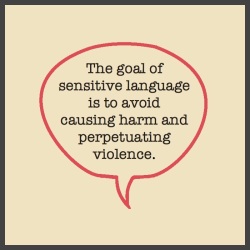
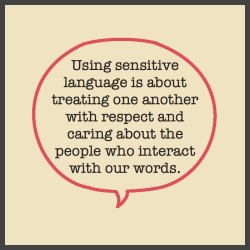
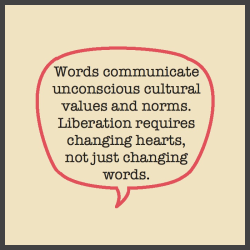
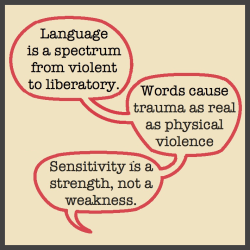

Go back:
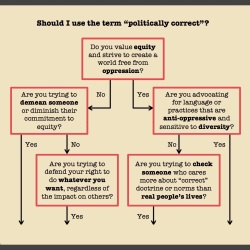
[Description of featured image above: Reason #1 for why we need to stop saying “politically correct”: it’s designed to be a slur, not a positive phrase. “PC” mythology speech bubble says: “Being politically correct means avoiding offensive language.” Radical truth-teller speech bubble says: “The term politically correct is a weapon used by people protecting their right to be biased.”]
This whole five-part series taking apart “PC” is great! I will be referring people here, especially I wish several times a week I could deliver such a good explanation of caring versus rule-following, and of the crap around “offended”.
Do you see people using “politically correct” from a viewpoint that’s sincerely praising it? I mean I gather you do, since you wrote this post. I don’t know that I’ve ever heard that — only from the those who are against it, and those who are for it and using the term with some jokiness. Interesting differences! Or does it happen around me and I’m missing it?
LikeLike
Thanks, caraway! Yes, I often see people using “politically correct” in a way that treats the term sincerely rather understanding it as inherently minimizing. See, for example, the fact that Merriam-Webster’s definition of the term is “conforming to a belief that language and practices which could offend political sensibilities (as in matters of sex or race) should be eliminated” without any mention of the fact that it is used derogatorily. This definition is actively harmful, and this understanding of the term leads to people constantly calling for political correctness as if it’s a positive thing.
LikeLike
When people have used the term PC (usually disparagingly), I have usually replied that I just want to be Purely Courteous, and do they disagree with being courteous to fellow human beings? But, even that may be conceding too much to the PC-brigade.
LikeLike